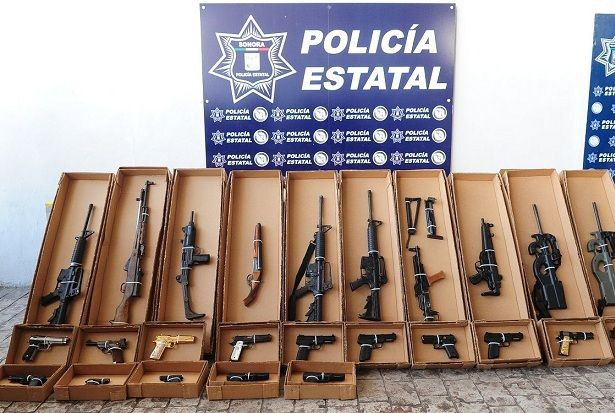American Arms Reach Deep Into Mexico’s Bloodshed

There is currently a heated debate surrounding gun violence and regulation in the U.S. in the wake of mass shootings last month in Newtown, Conn., and Aurora, Colo., several months earlier, but little has been said about the rampant violence in Mexico perpetrated by criminal organizations armed with American guns.
The basic scenario involves a U.S. citizen who buys firearms, typically assault rifles, and then sells them off to someone else who then runs the weapons down to Mexico for criminal use.
“Easy and ready access to weapons in the U.S. has been exploited by organized crime in Mexico and used in some of the most gruesome violence you can imagine,” said Eric Olson, director of the Latin American Program at the Wilson Center in Washington, D.C. “We’re not taking a position on the Second Amendment -- that’s just what we’ve observed from the data.”
According to the U.S. Bureau of Alcohol, Tobacco Firearms and Explosives, nearly 70 percent of all firearms recovered in Mexico and submitted to the agency from 2007 to 2011 were traced back to the U.S.
This does not account for all weapons used by drug trafficking cartels, but most analysts agree that the overwhelming majority of firearms that find their way into the hands of the "narcos" come from the U.S.
“The U.S. is the main provider of weapons,” said Steven Dudley, co-director of InSight Crime, which analyzes organized crime in Latin America. “We can quibble about percentages, but the fact of the matter is that most of the guns are coming from the U.S. … This plays a pretty large role in the violence.”
The Fellowship of Reconciliation, an advocacy group that has campaigned to end the violence in Mexico through actions in the U.S., has called for stricter gun control laws, such as a ban on assault weapons and high-capacity magazines as well as mandatory background checks on all gun purchases, which it believes would make it more difficult for the Mexican drug cartels to obtain the weapons.
“The amount of violence that is being committed with guns is unacceptable, and the debate (in the U.S.) needs to shift,” said John Lindsay-Poland, research and advocacy director for Latin America at FOR. “The victims of gun violence in Mexico need to be a part of the debate.”
Gun rights advocacy groups like the National Rifle Association have dismissed the role that firearms trafficked from the U.S. into Mexico have played in the estimated 70,000 deaths attributed to the drug war since 2006, outright denying the data itself and claiming that the majority of weapons used by the cartels are legally imported and sold off by corrupt army and police officers.
“There have been about 100,000 desertions from the Mexican military into the drug cartels over the past seven years, and one would have to be extremely naive to think that when those deserters leave their base, they are doing it empty-handed, without raiding the armory,” NRA spokesman Andrew Arulanandam told the Miami Herald in April last year.
“What needs to happen is that the Mexican government needs to crack down on the pervasive corruption that runs rampant within its own government, law enforcement, military and judicial circles,” he added.
But according to the Violence Policy Center’s analysis of the ATF data, the vast majority of the firearms submitted for tracing led back to civilian gun markets in the U.S., casting doubt on claims that the weapons are initially imported for use by the Mexican security forces.
Olson asserts from an analytical standpoint that stricter gun laws in the U.S. could have a sizable impact in reducing the cartels’ access to weapons, particularly if there were legal measures to crack down on gun traffickers, which are currently lacking due to resistance in Congress among those who feel such measures would threaten the Second Amendment.
“There is no national gun registry, which makes it very difficult for the ATF to share information and coordinate with local law enforcement,” Olson said. “This is all being interpreted (by gun rights advocates) as an attempt to take away their guns. Meanwhile, more guns are being trafficked into Mexico.”
Olson said that without the resources to track down traffickers, law enforcement has no incentive to go after them, and the penalties for the original buyers, also referred to as “straw purchasers,” are minimal, with offenders only receiving small fines due to the difficulties of proving intent to purchase for distribution to criminal organizations.
Dudley believes the gun control debate in the U.S. is not likely to produce results in Mexico, nor is what happens in Mexico likely to have a major impact on the direction of the American debate.
“It’s not really on most people’s radar,” he said. “They (Americans) have a complete disconnect when it comes to the availability and usage of guns (in the U.S. and Mexico, respectively).”
Dudley asserts that the Mexican people will be better served if the new government under President Enrique Pena Nieto avoids entering the U.S. gun control debate -- though he is certain it will -- and focuses on reforming its law enforcement and judicial systems and continues putting pressure on the most violent criminal organizations.
“That’s a more solid plan,” he said. “Mexicans should not be spending time trying to change U.S. gun laws -- it’s a lost cause.”
© Copyright IBTimes 2024. All rights reserved.





















